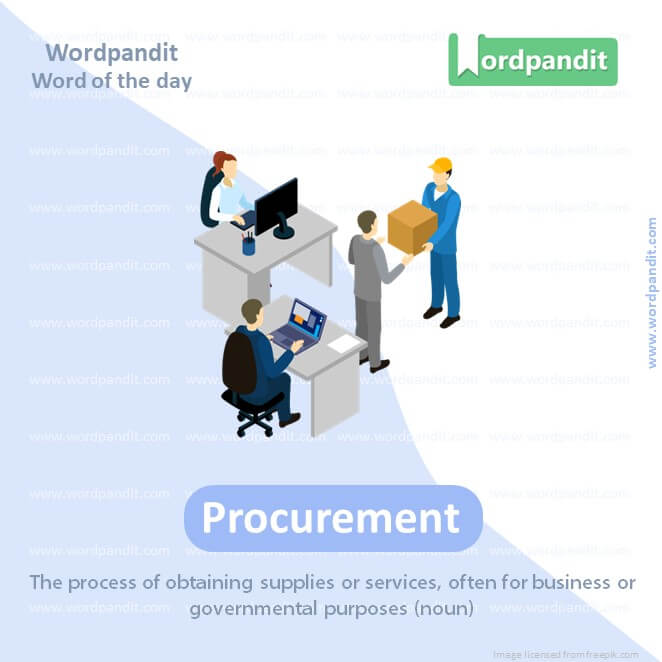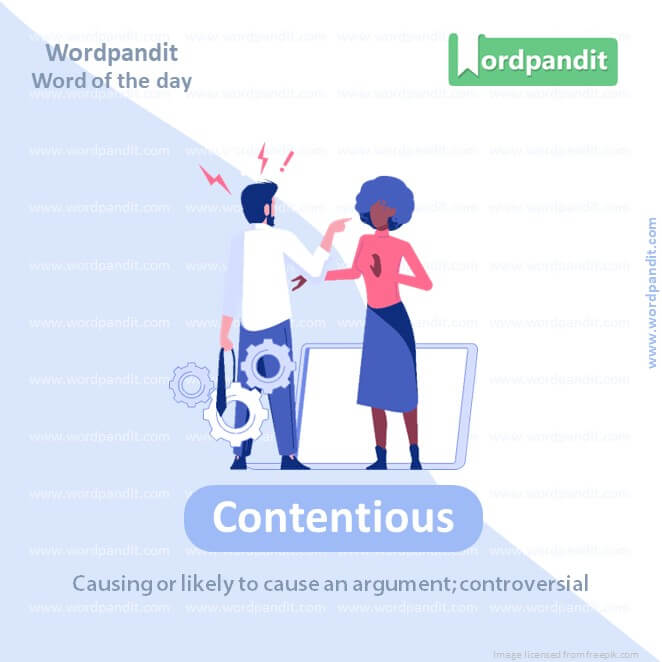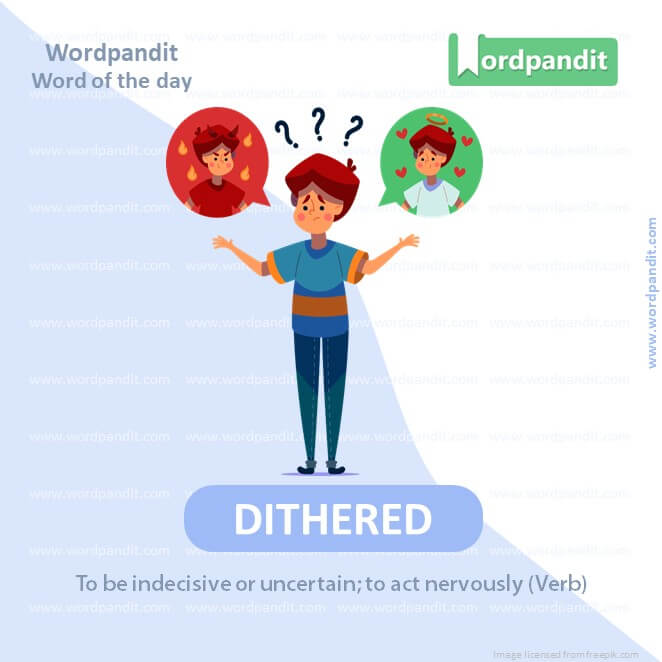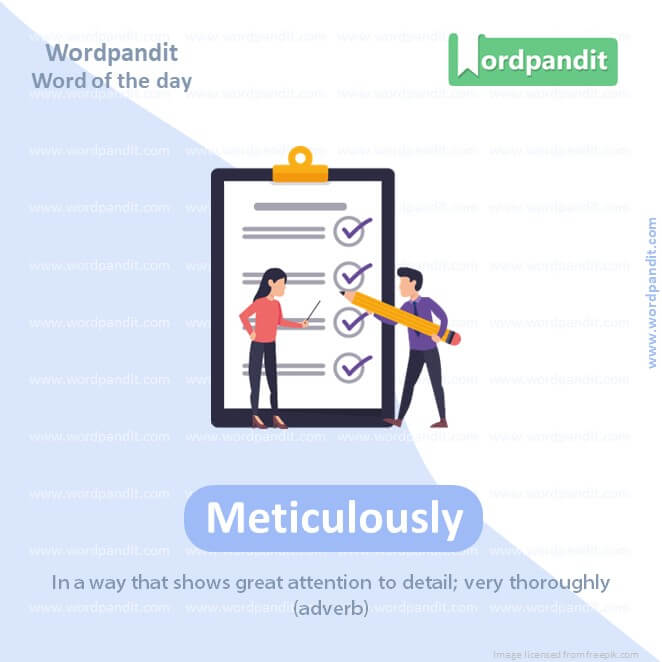Daily Vocabulary Words: List of Daily Used Words in Leading Indian Newspapers
Hi there. Welcome to this special section @ Wordpandit. Our endeavour here is straightforward: highlighting daily vocabulary words that you would come across in leading newspapers in the country. We have included the following newspapers in our selection:
• The Times of India
• The Economic Times
• Hindustan Times
• Mint
• Indian Express
We are putting in extensive work to develop your vocabulary. All you have to do is be regular with this section and check out this post daily. This is your repository of commonly used words; essentially, we are posting a list of daily used words. Hence, this has significant practical application as it teaches you words that are commonly used in leading publications mentioned above.
Visit the website daily to learn words from leading Indian newspapers.

WORD-1: Strenuous
CONTEXT: He understands that as a gig worker, no law protects him from losing his job or working unfixed strenuous hours. So he tells himself, “let me board that plane to Israel.”
SOURCE: Indian Express
EXPLANATORY PARAGRAPH: Imagine you’re trying to push a really heavy sofa across the room all by yourself. It takes a lot of effort, makes you breathe hard, and you might even sweat a lot. That’s what we mean when we say something is strenuous. It’s like when you’re using all your strength to do something really challenging!
MEANING: Requiring or using great effort or exertion (adjective).
PRONUNCIATION: STREN-yoo-us
SYNONYMS: arduous, laborious, tough, demanding, grueling, rigorous, difficult
USAGE EXAMPLES:
1. Climbing the mountain was a strenuous journey.
2. She undertook strenuous training for the marathon.
3. The doctor advised him against strenuous activities after his surgery.
4. Completing the project on time required a strenuous effort from the whole team.
WORD-2: Self-aggrandising
CONTEXT: The interim budget session of Parliament has just concluded. Nine days of the Union government using a deluge of several self-aggrandising adjectives — some romantic, others poetic and almost all unsubstantiated by fact.
SOURCE: Indian Express
EXPLANATORY PARAGRAPH: Imagine someone always talking about how great they are, showing off, and trying to make themselves look more important or better than others. That’s what self-aggrandising means. It’s like saying, “Look at me! I’m the best!” even when it’s not necessary.
MEANING: Acting to increase one’s own power, importance, or wealth, often in a way that shows off or exaggerates (adjective).
PRONUNCIATION: SELF-ag-GRAN-dizing
SYNONYMS: boastful, egotistic, self-promoting, arrogant, conceited, pompous, vainglorious
USAGE EXAMPLES:
1. His speech was full of self-aggrandising remarks about his achievements.
2. She disliked his self-aggrandising attitude.
3. The article criticized the politician’s self-aggrandising campaign.
4. He often shared self-aggrandising stories that seemed exaggerated.
WORD-3: Adherence
CONTEXT: The critique of the Court’s supposed favouritism towards the government is negated by its consistent adherence to legal rigour and constitutional fidelity.
SOURCE: Indian Express
EXPLANATORY PARAGRAPH: Think about when you promise to follow the rules of a game or listen to what your parents or teachers say. Adherence is just like sticking to those promises or rules, not breaking them. It’s like when you use glue to stick two things together; they stay close without coming apart.
MEANING: The act of following closely or sticking to a set of rules, beliefs, or instructions (noun).
PRONUNCIATION: ad-HEER-ence
SYNONYMS: compliance, observance, conformity, loyalty, fidelity, devotion, allegiance
USAGE EXAMPLES:
1. Her adherence to the diet plan was remarkable.
2. The project’s success depended on strict adherence to the guidelines.
3. Adherence to the company’s values is expected from all employees.
4. The teacher emphasized the importance of adherence to classroom rules.
WORD-4: Anonymity
CONTEXT: The anonymity provided by electoral bonds has been a point of contention, yet it is widely misunderstood.
SOURCE: Indian Express
EXPLANATORY PARAGRAPH: Imagine doing something nice for someone but not telling them who did it. That’s like being anonymous. You’re like a superhero who helps others without showing your face or telling your name. Anonymity is when no one knows who you are.
MEANING: The state of being unknown or unacknowledged by name (noun).
PRONUNCIATION: an-on-IM-i-tee
SYNONYMS: obscurity, namelessness, facelessness, incognito, unrecognizability, invisibility
USAGE EXAMPLES:
1. He preferred the anonymity of the big city.
2. The donation was made in anonymity.
3. Anonymity on the internet can be both a blessing and a curse.
4. Witnesses were offered anonymity to protect their identity.

WORD-5: Procurement
CONTEXT: As against the 2022 target of 44 million tonnes, government procurement was only 19 million tonnes.
SOURCE: Indian Express
EXPLANATORY PARAGRAPH: Imagine you have a list of things you need to buy for a big party, like balloons, cake, and decorations. Going out to get these things or ordering them so everything is ready for the party is like procurement. It’s just a fancy way of saying getting what you need.
MEANING: The process of obtaining supplies or services, often for business or governmental purposes (noun).
PRONUNCIATION: pro-CURE-ment
SYNONYMS: acquisition, purchasing, sourcing, buying, obtaining, securing, requisition
USAGE EXAMPLES:
1. The department is responsible for the procurement of office supplies.
2. Effective procurement strategies can save the company money.
3. The procurement process must be transparent and fair.
4. She works in procurement, dealing with suppliers and contracts.

WORD-6: Contentious
CONTEXT: Farmers are back on the streets.they marched to Delhi against the enactment of the three contentious farm laws, this time there is no immediate trigger.
SOURCE: Indian Express
EXPLANATORY PARAGRAPH: Think about when you and your friend can’t agree on which game to play, and it leads to a little argument. That situation is contentious because it causes disagreements or arguments. It’s like when something is so tricky that people start taking sides and sometimes argue about it.
MEANING: Causing or likely to cause an argument; controversial (adjective).
PRONUNCIATION: con-TEN-shus
SYNONYMS: controversial, disputable, debatable, argumentative, quarrelsome, divisive, polemical
USAGE EXAMPLES:
1. The proposal has been highly contentious among stakeholders.
2. They entered into a contentious debate over the new law.
3. The issue of climate change is contentious in politics.
4. He is known for his contentious nature in discussions.
WORD-7: Mongering
CONTEXT: The lack of clarity has obviously led to fear mongering, with exaggerated claims about fiscal costs, monopolisation of agricultural trade and missing markets.
SOURCE: Indian Express
EXPLANATORY PARAGRAPH: Imagine someone who spreads scary stories or rumors around, making everyone worried or upset. That’s what mongering means. It’s like when someone keeps talking about things that can make others feel scared or angry, like they’re trying to stir up trouble.
MEANING: Engaging in a particular trade or activity, often used in combination with words like “fear” or “war” to describe someone who promotes a specific type of negative activity (noun/verb).
PRONUNCIATION: MONG-er-ing
SYNONYMS: spreading, promoting, peddling, stirring up, inciting, instigating, fomenting
USAGE EXAMPLES:
1. The politician was accused of warmongering.
2. Fearmongering is a common tactic in sensational news stories.
3. The campaign was criticized for rumor-mongering.
4. He was known for mongering conspiracy theories online.

WORD-8: Dithered
CONTEXT: Despite political consensus, with most parties and unions supporting such a legal guarantee, successive governments have dithered on legalising this mechanism.
SOURCE: Indian Express
EXPLANATORY PARAGRAPH: Imagine you can’t decide whether to play outside or stay in and color. You keep thinking and changing your mind, and it takes a long time to choose. That’s dithering. It’s when you can’t make up your mind quickly.
MEANING: To be indecisive or uncertain; to act nervously (Verb).
PRONUNCIATION: DITH-erd
SYNONYMS: hesitated, vacillated, wavered, faltered, fluctuated, oscillated, equivocated
USAGE EXAMPLES:
1. She dithered for weeks before choosing a college.
2. He dithered over the menu, unable to decide what to order.
3. The committee dithered on making a final decision.
4. Dithered between taking a job offer or staying at his current job.
WORD-9: Implicitly
CONTEXT: This ruling not only halts progress but also implicitly endorses a return to the opaque, cash-driven practices that have plagued Indian politics for decades.
SOURCE: Indian Express
EXPLANATORY PARAGRAPH: Imagine your best friend knows exactly what you want for your birthday without you even saying it. That means they understand implicitly, or in a way that’s not said out loud but is understood between you two. It’s like having a secret understanding without using words.
MEANING: In a way that is suggested or understood without being directly expressed (adverb).
PRONUNCIATION: im-PLIS-it-ly
SYNONYMS: indirectly, tacitly, silently, unspokenly, assumedly, inferentially, understoodly
USAGE EXAMPLES:
1. She implicitly trusted her brother’s judgment.
2. The rules were implicitly agreed upon by everyone.
3. His loyalty to the company was implicitly understood.
4. The danger was implicitly communicated through his expression.

WORD-10: Meticulously
CONTEXT: By meticulously applying the law, the Court reaffirms its role as the guardian of constitutional principles, disproving accusations of partiality.
SOURCE: Indian Express
EXPLANATORY PARAGRAPH: Imagine you’re coloring a picture and you’re being very careful to stay inside the lines, making sure every tiny part is perfect. That’s being meticulous. It means you’re paying close attention to every little detail to make sure everything is just right.
MEANING: In a way that shows great attention to detail; very thoroughly (adverb).
PRONUNCIATION: me-TIC-u-lous-ly
SYNONYMS: carefully, thoroughly, painstakingly, precisely, scrupulously, fastidiously, diligently
USAGE EXAMPLES:
1. She meticulously organized her bookshelf by color and genre.
2. The artist meticulously painted every detail of the landscape.
3. The report was meticulously researched and well-presented.
4. He meticulously planned the trip to ensure everything went smoothly.
vocabulary in use
In the realm of language education, the concept of ‘vocabulary in use’ is exceptionally integral. It refers not merely to the memorization of words, but the practical application of those words within context-rich sentences and conversation. Essentially, ‘vocabulary in use’ stands as the wholesome approach to learning words and phrases the way they are prevalently used in language.
Many language learners stumble upon the roadblock of using vocabulary out of context. Hence, to prevent such linguistic disaster, ‘vocabulary in use’ comes as a rescue. It encourages learners to understand the words, their meanings, nuances, and appropriate application, making language use more authentic and natural.
How should ‘vocabulary in use’ be learned? The efficient approach to this is shifting from the age-old tradition of rote memorization to a modern application-based learning strategy. Put simply, it involves immersing oneself in a language-rich environment. For instance, you may read books, watch series, engage in conversations, or listen to music in your target language. This provides opportunities to encounter ‘vocabulary in use’ in its natural context, which facilitates deeper understanding, recall, and appropriate usage.
Deconstructing the ‘vocabulary in use’ further, learners should focus both on the meaning and usage of new words. Once a learner encounters a new word, they shouldn’t just learn what it means – they should also learn how and when it’s used. This provides an understanding of the contextual and stylistic application of the word.
To conclude, ‘vocabulary in use’ is an anchor point in language learning. This approach goes beyond plain memorization and encourages understanding words in their practical and conversational contexts. A conscious effort to learn ‘vocabulary in use’ can, indeed, enhance linguistic fluency, competency, and overall communication skills. As you journey to language mastery, remember, ‘vocabulary in use’ is your quintessential comrade!







